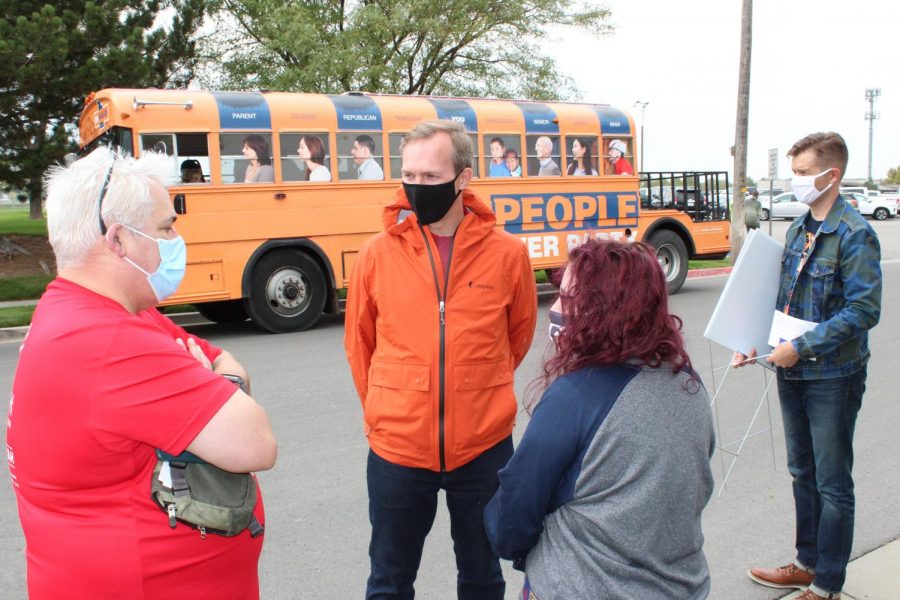Barron: Margins and Municipalities Matter: Why Utah Dems Still Need to Vote
UT-04 Democratic Candidate Ben McAdams with supporters. (Photo courtesy of the Ben McAdams campaign)
November 2, 2020
Donald Trump has a 96% chance of winning Utah’s electoral votes this November, Republican Gubernatorial candidate Spencer Cox leads his Democratic opponent Chris Peterson by more than 20 points and Republicans are predicted to hold onto their super-majority in Utah’s state legislature. Even though no votes have been counted, these victories seem imminent — a frustrating reality for Utah’s liberal voters, many of whom feel like their votes don’t matter. But even if liberal voters don’t swing statewide elections, they still wield incredible electoral power. Large Democratic turnout on Election Day can prevent political coronations and decide competitive regional races.
After landslide elections, politicians can wield their electoral success as a policy mandate — enacting key campaign promises with little opposition. The electorate’s overwhelming support can also give politicians the confidence to adopt a more extreme agenda as they can afford to alienate moderate voters. As Utah is so deeply conservative, Republicans hold a 26 point advantage in any statewide campaign, blow out elections are not uncommon. However, neither Trump nor Cox has secured that large of a lead in the polls. With Utah Republicans planning to vote for another candidate or skip the election, liberal voters have an opportunity to tighten the margins on these races. A relatively tight race in Utah for any Republican candidate may force conservatives to court moderate voters in future elections, preventing them from enacting or supporting ultra-conservative policies.
The presidency and governorship are not alone on the ballot — dozens of local races are being held across Utah. While these races don’t garner as much attention as statewide or national elections, these elected officials’ decisions impact our communities. Last year, the city council in my hometown passed an anti-abortion resolution to become a “sanctuary city for the unborn.” While this resolution has no teeth, it shames residents who need this legally available procedure. Down-ballot races can be more competitive than statewide elections, meaning that Democrats can reject conservatism in their own community and elect liberal representation by voting.
Just like the presidential and gubernatorial election, the race for Salt Lake County mayor has been defined by the current pandemic. Under Mayor Jenny Wilson’s leadership, Salt Lake County’s pandemic response has included some of the most strict public health guidelines in the state. In late June, Wilson petitioned the state for a countywide mask mandate in response to increasing cases. Her Republican challenger, Trent Staggs, was a critic of this mandate and his current position on masking is unclear. In a recent interview, Staggs said masks are “really important,” but later suggested masks are ineffective at preventing the spread of COVID-19 despite copious scientific evidence indicating they are. Democratic turnout in Salt Lake County is critical to re-electing Wilson and ensuring the county’s pandemic guidelines remain rigorous and grounded in science.
From flirting with the QAnon conspiracy to falsely portraying BLM protesters as violent, the Republican candidate for Utah’s fourth congressional district, Burgess Owens, has built his bid for Congress off of Trump’s brand. While Congressman Ben McAdams, the incumbent Democrat, has spent his term walking a “political tightrope,” putting the interests of his constituents before party politics, Owens has promised to “be loyal, period” to Trump if elected. Utah Democrats may not be able to swing the presidential election, but they have the power to reject Owens on the ballot. And since Owens leads the race by a single percentage point, McAdams’ re-election depends on strong liberal support on Election Day.
I am tired of this election. I have been talking and writing about it for the better part of four years. My election fatigue has only been amplified by the fact that the presidential and gubernatorial candidates I have campaigned and voted for will not win in Utah. If you are a liberal voter, you may be equally discouraged and may have thought about sitting this election out, but your vote matters even if it does not swing statewide results. When liberal voters participate in Utah’s elections, they tighten margins of victory and are crucial in electing down-ballot Democrats. If you haven’t cast your ballot because you feel like your vote won’t make a difference, please reconsider. Ballots can be returned to any of the drive-up ballot drop boxes through 8:00 p.m. on Election Day and in-person polling places will be open from 7:00 a.m. to 8:00 p.m. on Election Day. This close to the election, experts advise against mailing-in your ballot.








